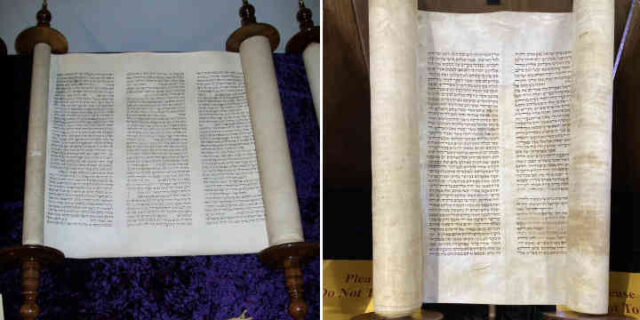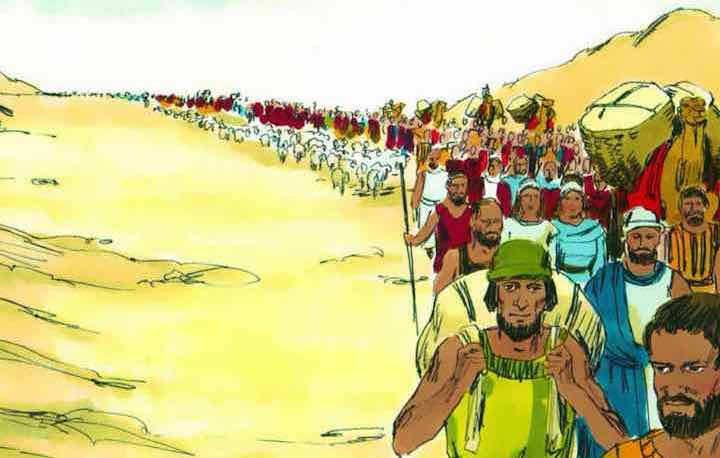Some Christians argue that fulfilment of Old Testament prophecies proves the divine origin of the Bible.
But critics have used the same prophecies to argue that the Bible was clearly NOT at all inspired by God.
How can there be two such opposite views about the same thing? Looking closer can teach us something about the Old Testament that both sides miss.
Prophecy? What prophecy?
In the Christian Old Testament there are 15 books that contain the sayings of 15 Hebrew prophets, including such famous names as Isaiah, Jeremiah and Ezekiel. In addition other characters in the more historical books are named as prophets, including Moses, Elijah and Elisha.
These prophets spoke and wrote messages they said were from God to the Jewish people. These messages were generally indictments of behaviours and lifestyle, teachings on the behaviour God required of them (both ethical and ceremonial) and warnings of the consequences of failing to follow these teachings. There were often warnings to other nations too.
Sometimes, as part of these warnings, their messages contained predictions of future events. These aren’t the main part of the prophets’ words, but they are what is used by apologists and critics alike to argue for and against the accuracy and truth of the prophets’ words, and from there to argue for and against the divine origin of the prophecies.
Of particular interest to Christians are those prophecies which are said to point forward to Jesus, the Messiah, from a distance of several centuries.
Some examples
Let’s look at a few examples of those prophecies referenced by apologists and critics
Ezekiel’s prophecies against Tyre
Tyre was a coastal city north of Palestine, located on the mainland and an off-shore island. The prophet Ezekiel, speaking about 590 BCE, gave an extensive and detailed prophecy about the destruction of Tyre (Ezekiel 26:3-14) by Nebuchadrezzar king of Babylon and “many nations”, and saying it would “never be rebuilt”.
Tyre was indeed attacked by Nebuchadrezzar in 586-573 BCE, and many of the details of destruction were fulfilled regarding the mainland city. But Nebuchadrezzar was unable to capture the island city despite a 13 year siege, because his land-based army had no ships.
Ezekiel apparently recognised this, for later (Ezekiel 29:17-19) he states quite clearly that Nebuchadrezzar hadn’t succeeded.
In 332 BCE Alexander the Great captured and destroyed Tyre, and as part of the assault built a causeway to the island using rubble from the remains of the old mainland city, a detail given by Ezekiel. (With the build-up of marine sediment, the former island is now a promontory.) But the city was re-built and remained an important city for centuries.
In 1291 CE, Muslims conquered the city and left it in ruins. But in the last two centuries Tyre was re-established and it is now Lebanon’s fourth largest city.
True or false?
Clearly large parts of Ezekiel’s prophecy were fulfilled, some by Nebuchadrezzar and some by other nations. But, contrary to Ezekiel, the city has been rebuilt. Apologists argue that the current Tyre is a different city in a slightly different location, but Google Maps shows that the contemporary city covers both the mainland and island areas (now joined) of the ancient city.

I think it is fair to say that Ezekiel got most of the big picture and some details right, but Tyre’s destruction was not as complete and final as he predicted.
Analysing two other prophecies, in which Isaiah and Jeremiah both predict the overthrow of Babylon by the Medes, leads me to a similar conclusion. The prophets got the broad sweep of events correct, but some of their details were fuzzy or inaccurate.
Messianic prophecies
Micah, in the 8th century BCE, said a leader of Israel would come from the town of Bethlehem, and “his greatness will reach to the ends of the earth” (Micah 5:2-4). In the New Testament, Matthew says this was a prophecy of the Messiah and applies it to Jesus (Matthew 2:1-7).
However there are two problems with this as a proof of prophecy. (1) It isn’t clear if Micah was prophesying the exact town of the Messiah’s birth or merely that he would be born from the line of David, whose hometown was Bethlehem, and (2) some scholars say Matthew wrote his story so that it fulfilled Micah’s prophecy.
Another example is Isaiah’s supposed prediction of the virgin birth of Jesus (Isaiah 7:14), referenced by Matthew (1:18-23). Again there are significant problems with using this as a proof of prophecy. (1) In the Hebrew language spoken by Isaiah, the word often translated “virgin” actually means a woman who hasn’t yet had a child. (2) The prophecy by Isaiah is about the birth of an actual child to a young mother, not because it is in any way miraculous, but to indicate the time scale of Isaiah’s prophecy that an impending invasion would be thwarted. There is no indication of any reference to a future Messiah.
The many Messianic prophecies may all be true and fulfilled prophecies, but they don’t easily function as proofs if divine inspiration. Critics can and often do easily dismiss them because (1) they are rarely clearly identified in the Old Testament as referring to a coming Messiah, and (2) critics can argue that Jesus deliberately acted to fit the prophecies or that the New Testament writers wrote their stories to fit. This doesn’t necessarily invalidate Christian belief in the Messianic prophecies, but it does make an apologetic argument difficult.
Protesting too much?
Examining these and other examples leads me (and many others) to conclude that both apologists and critics claim too much. Both “sides” have a view of prophecy that isn’t supported by careful study of Jewish idiom and culture. As we will see, they misunderstand prophecy and make assumptions about how literally it should be interpreted.
Sometimes it looks like the apologists assume the prophecy is from God and then look to find a way to show it is true. They assume that their dates for the prophecies are literally correct, whereas this isn’t always clear. Some critics argue the prophecies were written after the event, though if they were, you’d expect them to be 100% correct, which the critics claim they are not.
The sceptics are similar but opposite. They believe the prophecies cannot be genuine and so look for any detail they can find that throws it into question. THey tend to ignore those features that have been fulfilled.
Neither side seems to place a priority on understanding the culture and way of writing at the time. There is a better way of approaching Old Testament prophecy.
Understanding prophecy
Reading what the experts say leads me to four principles that can help us better understand Old Testament prophecy.
1. Understand ancient culture and literature
This is obvious, but needs to be our starting point. Whether we believe the Old Testament is the very Word of God or bunch of ancient fairy tales, or something in between, it was nevertheless written by ancient peoples who had their own culture and language which were very different from ours.
If we misunderstand literary genre, or, worse, don’t even care to understand it, we will likely totally miss what the authors’ intentions were. We’ll likely end up making wrong claims either for or against the texts.
2. Prediction wasn’t the purpose of most prophecies
The prophets and their hearers believed they were sharing an important message from God. It might be a criticism, a warning or a promise. It might foreshadow some action by God. It might be directed to Israel or against another nation. But what God was thinking, saying or doing was obviously seen as the important core of their message.
Prediction of the future was only incidental to that purpose.
Furthermore, many prophecies were conditional. God’s actions could be different if the hearers responded rightly. In such cases, simply arguing the prophecy wasn’t fulfilled is no indication of its truthfulness.
In the end, the prophets wrote to communicate a message, not to provide proof or disproof of the source of their words. I suggest we would do well to try to understand the message and whether it is true, appropriate and believable, rather than focusing on details which we think may prove our viewpoint.
3. Ancient Jews wrote about the past differently
This is probably the most important principle.
The ancient Jews didn’t write history as we might hope – objectively, factual, accurate. (It is doubtful if even modern histories are as objective as we might imagine!). Their interest was in what they saw as the deeper reality behind the actual events, and for them, the deeper reality was God and his actions in the world.
Myth, imagination, hyperbole, telescoping of events, use of figurative or stereotyped language and selective reporting might all be used to portray that deeper reality better than mere reporting can. That is why some scholars use terms like “mythicised history” to describe some of the historical narratives in the Jewish scriptures. There is a historical core but some of the details may be more for effect than literal accuracy.
Furthermore, most texts in this period were preserved and transmitted orally long before they were written down. And oral transmission tends to preserve the core of the stories being told while allowing creativity about some details, sometimes adjusting the story to answer contemporary concerns.
The sayings of the prophets need to be considered in this light. It is likely that some of the details that we moderns may argue about were simply pictures that illustrate the main thrust of the oracle. Some of the language is steretyped and hyperbolic, aimed at expressing the seriousness and force of the message from God.
By focusing on whether every detail came true or didn’t, both apologists and critics miss the point and misunderstand the intentions of the prophets.
4. And they interpreted writings differently too.
We can see this in the way the final editors of documents in the Old Testament often preserved two different versions of events. For example, the first half of the book of Joshua tells a story of fierce and total conquest, but the second half is a story of much slower assimilation. The editors couldn’t have been unaware of the differences, but they were happy to retain both accounts.
We see the same in Ezekiel. The final editors included both the original prophecy and Ezekiel’s later statement that contradicted it. We can assume they saw Ezekiel’s oracle as reflecting God’s judgmnent of Tyre even if that judgment wasn’t fully carried out.
It is interesting that when Jesus and the New Testament writers quote the Jewish scriptures, including some of the prophets, they are also flexible and creative in how they use them. Richard Longenecker says this was acceptable in Rabbinic Judaism.
An example is the Isaiah prophecy of the young woman conceiving and bearing a son. The original oracle had an immediate application and Isaiah didn’t seem to have the virgin birth in mind at all! But, Longenecker argues, the New Testament teachers often took prophecies and re-applied them, so that they took on new meanings. And so Matthew, already believing in Jesus’ virgin birth, saw he could re-use the Isaiah passage.
We misunderstand if we use these prophecies as proofs or disproofs. They are new applications which give new meanings that the original prophet never intended, but which helped the Christian teachers explain their belief.
Lessons all round
I have an (online) friend who gave up his Christian belief partly because he was taught that the prophecies were predictions whose veracity proved their divine origin …. and when he studied them he was shocked. The one thing in common between his former faith and his later disbelief was thinking that the prophecies were supposed to be literal and factual predictions.
Even when he became an atheist, he continued to believe some of what he had been taught about prophecy in his very conservative church.
If Christians want to be true to the prophets, and if critics want to argue on a sound historical basis, I feel both could learn two lessons.
Understand before arguing
It is unfortunate that much Christian apologetics is poorly based. In trying to persuade non-believers to change their mind, Christians surely must do their homework first. Don’t just believe what some apologists says (or what I say!), but verify things. Understand how the experts understand Old Testament prophecy. Check out for yourself whether the prophecies were literally and factually fulfilled, wholly or in part.
But critics are often just as disconnected from the facts. I feel it would be helpful if they would understand how the experts view the oracles of the Old Testament prophets. If they must argue, make sure they are arguing against good Christian understandings, not poor ones.
But there is a better way for both sides.
Consider the message more than the prediction
Does the prophet seem to have an insight into God’s character that is helpful? Or does he portray God in a way contrary to what Jesus taught or what you already believe about God?
I don’t care so much about whether the predictions came true in complete detail, but whether they showed an insight into God’s actions and character, that explains subsequent events.
I believe the Bible contains an unfolding revelation. Some things that were understood and written down were later corrected or amended. (This will be the subject of a later post.) So I believe I need to interpret prophecy, and indeed the whole Old Testament, with that unfolding revelation in mind.
Critics might do well to consider those matters too, and adjust their polemic accordingly.
References
Books
- Wisdom for Faithful Reading. John H Walton. IVP. A goldmine of insights from an open-minded Christian scholar.
- Biblical Exegesis in the Apostolic Period. Richard N. Longenecker. A detailed study of how the Jewish scriptures were interpeted in the first century.
- How the Bible Really Works. Peter Enns. I don’t agree with everyhting Enns writes, but he has lots of useful information and insights that you don’t often find elsewhere.
Sceptical websites
- Prophecies: Imaginery and Unfulfilled. Farrell Till, The Secular Web.
- Claimed Evidence: Prophecy in the Bible. Skeptical Science.
- Ezekiel’s False Prophecy Against Tyre. Bible Verses Rarely Read on Sunday.
- Jesus and the Messianic Prophecies – Did the Old Testament Point to Jesus? Bart Ehrman.
Apologetic websites
- Fulfilled Prophecy: Evidence for the Reliability of the Bible. Hugh Ross, Reasons to Believe.
- 100 Prophecies: the book. Ray Konig.
- Tyre in Prophecy. Kyle Butt. Apologetics Press.
- Ezekiel and the Oracles Against Tyre. Dennis Bratcher. The Christian Resource Institute.
- Messianic Prophecies. Jewish Voice.
Main graphic: scrolls of the prophets Isaiah (Pete unseth) and Ezekiel (written in Russia in the 1700s, photo by Pete unseth).
Photo of modern Tyre: RomanDeckert.




